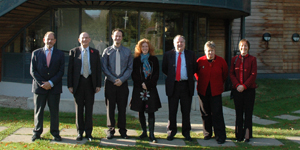
Inter-disciplinary perspectives on restorative approaches to reducing conflict in schools: exploring theory and practice from cross-national and international settings.
ESRC-funded Seminar Series October 2009- July 2011
Investigators
Dr Hilary Cremin, University of Cambridge; Dr Gillean McCluskey, Moray House School of Education, Edinburgh University; Dr Edward Sellman, School of Education, Nottingham University.
Aims and Objectives
The main aim of the proposed series is to establish an inter-disciplinary cross-national seminar group made up of academics from education, criminology, law, social work and social policy, and key figures from the public, legal and voluntary sectors involved in Restorative Approaches (RA). The group will:
- Examine the commonality and divergence in the key theoretical models which underpin RA in schools and Restorative Justice (RJ) in the criminal justice system
- Develop new theoretical understandings for the study and application of RA in schools and Children's Services, and disseminate these to academics and research users across policy arenas
- Enable those involved in RA research, policy development and implementation in schools and Children's Services to benefit from international and home-international cross-disciplinary and cross-cultural comparison through participation in the seminars and its disseminated outcomes
- Explore both the opportunities and challenges offered by RA in educational contexts
- Examine the evidence-base of the fields underpinning RA in schools and RJ in the criminal justice systems in order to determine areas for further research and investigation
- Form a strategy for continuing theoretical and methodological discourse about RA, and the dissemination of this discourse to academic and practitioner communities, especially teachers and teacher educators

Speakers
A range of English, Scottish and international speakers have been invited, and these include, for example, Prof Lawrence Sherman from the University of Cambridge, Institute of Criminology, Rt. Hon Lord Falconer, Former Lord Chief Justice and government minister, and Dr Wendy Drewery, Waikato University, New Zealand, School of Education.
Core Group
The core group members will attend all seminars and meet without speakers for the fifth seminar to discuss outcomes and next steps. Members of the core group include academics and research students from Education, Social Policy, Law and Criminology, policy-makers from the Youth Justice sector, teachers and charity workers.
Attendees
In addition to the core group, further academics, policy makers, practitioners and research students will be invited to attend individual seminars by the host institution. Lunch and travel expenses for research students will be paid.
Seminars
- Seminar One (London, Thurs 4th Feb 2010): Theoretical and Conceptual Perspectives of RA
- Seminar Two (Cambridge, Mon 21st June 2010): International Perspectives on RA
- Seminar Three (Nottingham, Tues14 Sept 2010): Inter-disciplinary Perspectives on RA
- Seminar Four (Edinburgh, Wed 16th Feb 2011): RA in Educational Settings
- Seminar Five (Cambridge, Thurs 23rd June 2011): Consolidation and Dissemination
Outcomes
By the end of the series, it is anticipated that the following will be in place:
- A special interest group, perhaps supported by a research centre in one of the universities, that will continue to meet after the end of the seminar series
- Proceedings from each seminar to be distributed electronically to all speakers, members of the core group and additional attendees within a month
- A research agenda, and at least one proposal submitted to a major social science research funder for further cross-disciplinary cross-national research into the nature and impact of RA in schools in the UK and internationally
- Papers from the seminars to be written up as an edited collection through an educational publisher, such as Routledge, Open University Press or Sage
- A series of papers for peer reviewed education and social policy and criminology journals, and possibly a special issue of an existing peer reviewed journal in one of these fields.
- At least three articles in professional journals accessed by teachers and other ECM/GIRFEC professionals and volunteers
- A proposal for an ESRC studentship in RA in schools, informed by the findings of the seminar series
- A web presence supported by the three universities of the main applicants
